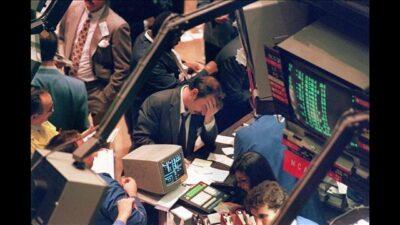
image credit ksdk.com
The stock market could lose 20 percent or more of its value in the next few months.
That’s the pronouncement of Swiss investor and market analyst Marc “Dr. Doom” Faber. Faber believes the market looks much as it did in 1987, when it lost 37 percent of its value between August and October.
If you’ve been paying attention, you know that the stock market has been booming lately; the S&P 500 hit an all-time high of 1,709 earlier in August. Faber thinks the S&P soon will collapse because fewer and fewer stocks are hitting a 52-week high in share prices. He also noted that at least 170 stocks had fallen to 52-week lows in recent weeks.
The Market Is Extremely Unstable
Faber is so confident of his pronouncements that he actually appeared on CNBC’s Futures Now show to make the pronouncements. He is correct when he notes that the market is extremely unstable right now.
The S&P’s recent rise has largely been fueled by a few high-performing stocks such as Apple ($455 a share on Aug. 9), Google ($892.48 a share), MasterCard Inc. ($641.36 a share), and Amazon.com Inc. ($298.77 a share). If any of these stocks takes a tumble in price, it’ll drive the price of the market down.
The market also has been spooked by some outside factors such as the Federal Reserve’s Quantitative Easing stimulus program, the purchase of vast numbers of mortgage bonds in an attempt to buoy up the economy. Another market expert, Wharton School Finance Professor Jeremy Siegel, believes the end of this program could cause the market to fall.
New book reveals gold-buying secrets that dealers don’t want you to know about…
Others Think the Market Will Rise
Strangely enough, Siegel believes the market will continue to rise. Appearing on CNBC, he recently projected that the Dow Jones Industrial average will hit 18,000 in 2014. Siegel has been right before. He famously predicted that the Dow would hit 15,000 in 2013; it did in May, and it has kept going up.
Basically, both of these experts are saying that the stock market is completely unstable right now.
Interestingly enough, both Siegel and Faber think the market is going to recover. In 1987 the market shocked almost everyone by quickly recovering after the fall. Instead of a crash on the scale of a 1929-style catastrophe, which wiped out stock value for an entire generation, the 1987 crash was followed by two decades of constant growth in stock value.
A Depression with a Booming Stock Market
The question is: How would a sudden stock crash affect average investors and the overall economy? My guess is that it would not have that much of an effect; much of the US economy is already in a state that’s pretty close to a depression. Only constant government spending and efforts like quantitative easing are keeping the economy from sliding into a complete depression.
The effect of a sudden drop in stock value outside Wall Street is likely to be minimal — particularly if stocks quickly regain their value. What will most likely happen after a massive drop in value is a buying spree. Investors with cash, such as Warren Buffett, will jump in to buy up all the cheaper stocks.
A crash will harm 401K and other stock-based investments that are tied to stock market indexes. It will not have a big impact on those who do not own stocks and those who are holding stocks for the long term. It’ll hurt those trying to make money from market speculations and persons playing around with things like Forex.
How Should You React?
Something else you must remember is that we still don’t know what caused the crash of 1987. Most observers, such as securities trader and philosopher Nicholas Nassim Taleb, the creator of the Black Swan theory, believe it was a computer glitch, but nobody’s proven that; unlike the crash of 2008, which was caused by the crash of the mortgage market.
That means a crash like that in 1987 could occur at any time. The modern market is that unpredictable, and here’s something that preppers probably don’t want to hear: Gold prices can be just as vulnerable to such corrections as stocks.
If you want to protect your money, diversify it; have some in cash, some in precious metals, some in stocks or real estate, and so on. You also should take at least part of your assets and invest them in a stockpile of food and other necessary items that can help your family survive. Those who diversify will protect their money and survive. Those who put their money into any one investment could lose it all.
 Off The Grid News Better Ideas For Off The Grid Living
Off The Grid News Better Ideas For Off The Grid Living




